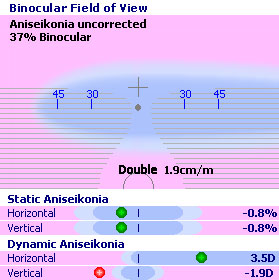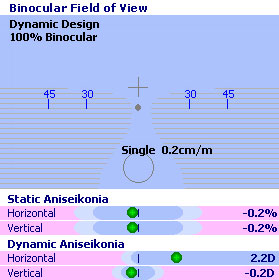Linear prism correction for esophoria. Age 62.
| Sphere | Cylinder | Axis | Add | PD | Prism | Prism | |
| OD | -1.75 | 2.50 | 28.5 | 4 out | 0.5 up | ||
| OD | -2.25 | 2.50 | 28.5 | 4 out | 0.5 down |
| BU | BD | BI | BO | ||||
| 0.5 | 0.5 | 0 | 20 |
| Eye | DBL | Wrap | Vertex | Height | |||
| 53 | 18 | 2 | 12 | 17 |
This patient has a very fragile binocular system. Her high esophoria is manifest constantly and requires a substantial prismatic correction. The SHAW lens software optimizes base curvatures to reduce binocular distortions from the prism and remove the influence of a small degree of anisometropia. Fortunately, the lens thickness actually induces base out prism in lateral gaze, in this case a welcome distortion. The SHAW lens design system automatically selects a lens with a high Abbe value.
A very important benefit is the opportunity to give instructions to the edging lab as to how much to decentre the lenses in order to maintain alignment of the major reference point. In this case, the lenses must be decentred 27.2 mm and 27.3 mm from the PD of 28.5 in the eyes due to their rotation towards the prism apex.



Conventional lenses severely limit the binocular field due to the lack of attention to motor fusion facility. Only the SHAW lens considers these values in the design process.